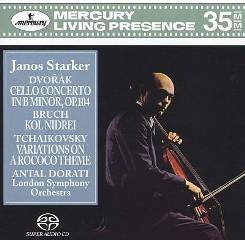Janos Starker: Dvorak, Bruch, Tchaikovsky - Cello Works (1990)
Janos Starker: Dvorak, Bruch, Tchaikovsky - Cello Works (1990)

Dvorak - Cello Concerto in B minor, B. 191 (Op. 104) 1 1. Allegro 15:07 2 2. Adagio ma non troppo 11:10 3 3. Finale. Allegro moderato 11:47 Bruch 4 Kol Nidrei, for cello & orchestra, Op. 47 9:56 Tchaikovsky 5 Variations on a Rococo Theme, for cello & orchestra (or cello & piano) in A major, Op. 33 Janos Starker – cello London Symphony Orchestra Antal Dorati – conductor
Mercury are justly proud of the recordings they made in the early stereo epoch and are now enabling us to hear them as never before. Though I have heard this only in its CD form, this recording has range, depth and definition that are truly amazing, with every detail of Dvořák’s orchestral score (and what a lot of detail it has!) heard as, quite frankly, never before, yet all sounding quite naturally balanced with the solo cello. If it had been sent to me as a recording made in the last year or so, I don’t think I would ever have suspected otherwise. Compared with other early stereo accounts, for example the Rostropovich/Boult/EMI (the cello sounds fine but the orchestra is congested) or the Hoelscher/Keilberth/Telefunken (a beautiful performance ruined by the backward placing of the orchestra though, again, the cello sounds well), this is in another league.
This is all to the good, of course, but since recordings made during the last year or so also sound like recordings made in the last year or so, and sometimes contain excellent performances, the question of the actual interpretation still matters.
Dorati begins rather slowly and ominously, and I kept expecting him to whip things up, but no, he concentrates on a broad, majestic interpretation, with much expressive leeway at the famous horn theme, too much to sound really natural. It is due to his keen ear, of course, as well as to the recording, if many details are uncovered which are often passed over, but the lack of real momentum is a considerable price to pay. He also tends to emphasize the obvious, and both after the opening ritornello and the orchestral passage which ushers in the development, his preparation for the soloist sounds pedantic ("listen", you almost hear him saying, "the soloist is going to enter soon") and robs the music of its adorable spontaneity.
And what happens when the soloist does enter? Well, as we know, Starker is a fine cellist and musician, and of course everything is finely played, but there is not a great variety of tone and he too has quite a lot of points to make. There is plenty of very romantic-sounding rubato, but in the last resort I didn’t really warm to it, finding it more an intellectual analysis of romanticism than the real thing. Starker and Dorati between them seem to want to present a darker, more sombre Dvořák than usual and, while it is always interesting to hear a great work in another light, to hear this composer rigorously shorn of all that makes him lovable is a little depressing. At the start of the finale Dorati seems to want to suggest that this music might have influenced the opening of Mahler’s 6th symphony – the homely world of Bohemian dance is left far behind.
I have always remained loyal in this work to Rostropovich with Boult; though Rostropovich is very free in his expression, Boult somehow manages to keep the overall structure in view, as was not the case with the great cellist’s more indulgent later partners, from Karajan onwards.
The Bruch leaves me in a similar quandary. It sounds like a performance with all the right romantic gestures, but music is not just about sound, and a performance can sound right while feeling wrong, which is what this one does to me. The Tchaikovsky is very neatly played, but perhaps Starker’s rather intellectual approach is best suited to earlier and later music. ---Christopher Howell, musicweb-international.com
download (mp3 @320 kbs):
yandex 4shared mega mediafire zalivalka cloudmailru uplea








